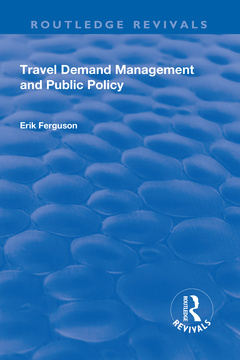Travel Demand Management and Public Policy Routledge Revivals Series
Auteur : Ferguson Eric

This title was first published in 2000: Describes policy innovations in transportation system management, planning and operations in the US that explicitly address interactions between transportation demands and travel behaviour in a mixed economy. The author shows how travel demand and management programmes function in the context of transportation supply and demand, investment, technology, pricing, management and marketing policies and procedures, with examples of voluntary, market-based and regulatory approaches to transportation and activity system management and institutional change. The author describes a variety of evaluation methods and models designed specifically for TDM programmes, and how these can be used to better inform decision-makers and other stockholders in the process of transportation policy formulation. TDM programmes have serious potential to increase the efficiency of a wide variety of transportation systems. Institutional obstacles are likely to prevent full implementation in the near future, but partial efforts are underway and likely to continue and succeed, under proper circumstances.
Date de parution : 12-2017
14.7x21.5 cm
Mots-clés :
HOV Lane; institutional change; TDM Program; system management; NMT; transportation system; Federai Govemment; travel demand; Parking Pricing; Erik Ferguson; Cafe; TSM; Road Pricing; Alternative Hours; Travel Behavior; Congestion Pricing; Parking Requirements; TDM Program Implementation; Impact Fees; Compressed Weeks; Urban Passenger Transportation; Traffic Calming; Development Impact Fees; Street Parking; Urban Transportation Planning; Growth Management; Implement TDM Program; Direct User Fees; Transportation Planning; HOV Facility



